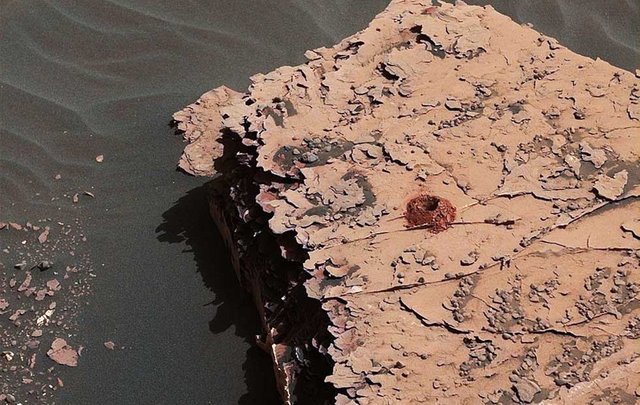Dear Steemians,
Today I present you "Stunning discovery on Mars: The Curiosity Rover found organic matter in the soil of a former Martian lake"
. . .
NASA has discovered a complex organic matter buried and preserved in sediments formed by a vast lake on Mars, more than 3 billion years ago.
The discovery would be the most convincing proof that, long before the red planet became a non-risky place, the Martian Lakes were a rich carbon-rich soup needed for the development of life.

Researchers can not tell how the organic material was discovered. Are the remains of the compounds of some previous organisms, the product of chemical reactions, or was it brought to Mars by comets or other debris that collapses on Martian soil?
Regardless of the source of the material, if the microbial life found a "support point" on Mars, it means that the planet could have accommodated, with some adjustments, even more complex organisms:
“We know that on Earth microorganisms eat all sorts of organics. It’s a valuable food source for them,” said Jennifer Eigenbrode, a biogeochemist at Nasa’s Goddard Space Flight Center in Maryland.
“While we don’t know the source of the material, the amazing consistency of the results makes me think we have a slam-dunk signal for organics on Mars,” Eigenbrode added. “It is not telling us that life was there, but it is saying that everything organisms really needed to live in that kind of environment, all of that was there.”
The Curiozity Rover explores the Mars planet from the mourning in August 2012. Nowadays climbs Mount Sharp at an altitude of about 5 kilometers from the center of the Galea Crater region.
In this Galea crater, the Curiozity Rover has discovered three different types of organic molecules at a depth of 5 centimeters in the sediments of Mars. When the samples were heated to 500-820 degrees Celsius, aromatic, aliphatic and thiophene vapors were detected. The latter contain carbon, hydrogen and sulfur, and scientists believe that they are debris generated by the destruction of larger organic molecules.
“To me it is amazing that we can show we have organic matter preserved for more than 3bn years in these rocks,” said Kirsten Siebach, a planetary geologist who was not involved in the work at Rice University in Houston, Texas. “This is very promising for the preservation of potential ancient life on the planet.”
“These molecules could have been part of life, but they could also have been food for life,” Siebach added. “To know that the water really was full of organic molecules really opens up the different ways that life could have existed on Mars.”
Thank You for reading and your upvotes
. . .

You got a 43.42% upvote from @minnowvotes courtesy of @lazarescu.irinel!
Downvoting a post can decrease pending rewards and make it less visible. Common reasons:
Submit